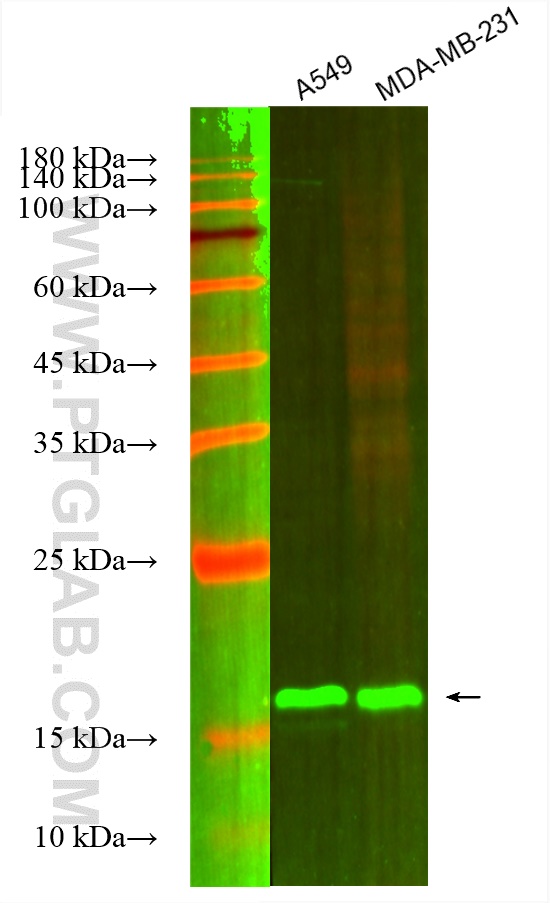验证数据展示
经过测试的应用
| Positive WB detected in | A549 cells, MDA-MB-231 cells |
For other applications, we recommend the unconjugated version of this antibody, 66683-1-Ig
推荐稀释比
| 应用 | 推荐稀释比 |
|---|---|
| Western Blot (WB) | WB : 1:500-1:2000 |
| It is recommended that this reagent should be titrated in each testing system to obtain optimal results. | |
| Sample-dependent, Check data in validation data gallery. | |
产品信息
CL488-66683 targets Betacellulin in WB applications and shows reactivity with human samples.
| 经测试应用 | WB Application Description |
| 经测试反应性 | human |
| 免疫原 | Betacellulin fusion protein Ag26724 种属同源性预测 |
| 宿主/亚型 | Mouse / IgG1 |
| 抗体类别 | Monoclonal |
| 产品类型 | Antibody |
| 全称 | betacellulin |
| 别名 | BTC, Probetacellulin, 2H5E8 |
| 计算分子量 | 20 kDa |
| 观测分子量 | 20 kDa |
| GenBank蛋白编号 | BC011618 |
| 基因名称 | BTC |
| Gene ID (NCBI) | 685 |
| RRID | AB_3672921 |
| 偶联类型 | CoraLite® Plus 488 Fluorescent Dye |
| 最大激发/发射波长 | 493 nm / 522 nm |
| 形式 | Liquid |
| 纯化方式 | Protein G purification |
| UNIPROT ID | P35070 |
| 储存缓冲液 | PBS with 50% glycerol, 0.05% Proclin300, 0.5% BSA , pH 7.3 |
| 储存条件 | Store at -20°C. Avoid exposure to light. Stable for one year after shipment. Aliquoting is unnecessary for -20oC storage. |
背景介绍
Betacellulin (BTC), a member of the epidermal growth factor (EGF) family, binds and activates ErbB1 and ErbB4 homodimers. BTC is synthesized primarily as a transmembrane precursor, which is then processed to mature molecule by proteolytic events. This protein is a ligand for the EGF receptor. BTC was expressed in tumors and involved in tumor growth progression.
实验方案
| Product Specific Protocols | |
|---|---|
| WB protocol for CL Plus 488 Betacellulin antibody CL488-66683 | Download protocol |
| Standard Protocols | |
|---|---|
| Click here to view our Standard Protocols |
